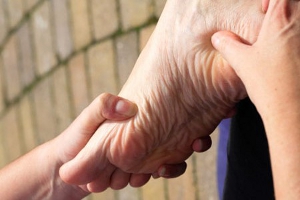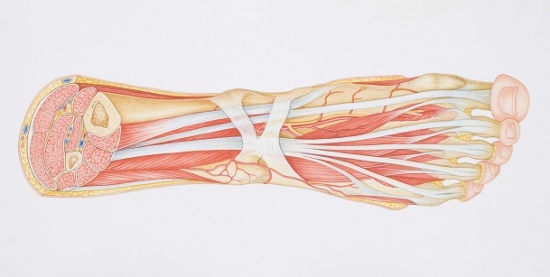Worried because of constant foot pain? The following article provides information on foot tendons, tendon injuries and ligament pain. Read on, to know the causes of foot tendon injuries and how some simple home remedies help get rid of the pain and discomfort caused by the injury....
 Enlarge Image
Enlarge Image
Fibers of connective tissues which join the muscles to the bones are called tendons. Inflammation or swelling of these tendons is called 'tendonitis'. Like tendons of the foot, foot ligaments, the tough bands of elastic tissues which connect bones to each other, can get torn due to improper movement of the foot. Severe joint pain accompanied by swelling, redness and irritation is the main symptom of foot tendonitis. Tendons and ligaments along with bones and muscles in the foot support the foot; which in turn supports the whole body.
Tendons in a Foot
If you check the anatomy of foot, you will find that the structure of the foot is very complicated. It consists of 26 bones, 33 joints, and more than 100 muscles, tendons, and ligaments.
The peroneal brevis tendon, the tendon of the tibialis anterior muscle, the tendon of the tibialis posterior muscle, the tendon of the peroneus longus, and the tendons of the flexor hallucis longus and flexor digitorum longus muscles are some of the tendons in feet which are prone to injuries. Achilles tendon present at the ankle joint is the thickest and strongest tendon in the body. It connects the heel to the muscles of the lower leg. Achilles tendon enables us to stand on the toes, walk, run and jump.

An injury to a tendon gives rise to pain in that particular part of the foot. The pain may spread to other parts of the foot and ankle. Foot problems can cause pain and inflammation leading to limited movement of the foot, resulting in restricted mobility. As feet bear the weight of your body, foot tendons are susceptible to various types of stresses while standing, walking, running, and jumping. Have you ever experienced pain due to ankle sprain? Severity of ankle pain or foot pain depends upon how much the ligaments are stretched or torn.
Causes of Foot Tendon Injury
- Wearing shoes that are not fitting properly or constant use of high-heeled shoes can lead to injured tendons.
- Sudden, improper movement of the foot or severe foot cramp can cause tendon injury.
- Foot tendon injuries due to repetitive sports or other activities and trauma are quite common.
- A structural defect or injury to any part of the leg, hip-joint or even back can lead to the development of problems in the foot.
- Aging or 'wear and tear' naturally results in weak tendons and ligaments, leading to injuries.
- Diseases and disorders like diabetes leading to peripheral neuropathy can be the cause of tendon injuries.
- Obesity is one of the leading causes of injured tendons in feet. Excess body weight creates excess pressure on feet, making the structure more prone to injuries.
- Rheumatoid arthritis affects the structure of the joints. Elderly or aged people suffering from arthritis are therefore affected by foot tendon injuries and ligament pain.
- Overuse of tendons makes them more prone to injuries. Foot tendonitis can be experienced even by younger people in case of repeated injury to the tendon because of overuse.
- Weak muscles and loose ligaments can cause foot tendonitis. Healthy diet, good eating habits and regular exercise, prompt treatment for diseases and disorders is essential to avoid foot tendonitis.
- Overstretched tendons are prone to degenerative tears as such tendons may become thin. One has to be careful during physical activities like running, mountaineering, cycling, and other sports activities.
- People with flat feet or with very high arches are more likely to suffer from feet tendon injury. The posterior tibial tendon helps keep the arch of your foot. Injury to the tendon can cause swelling and pain in the foot.
- Plantar fascia is the long ligament-type structure which supports the longitudinal arch of the foot when walking. It is made up of three bands, the medial, central and lateral band. Plantar fasciitis may cause pain in the heel as you take the first step in the morning. The most common cause for heel pain is plantar fasciitis.
- Sports personalities or athletes who entail sudden starts and stops are likely to develop achilles tendonitis. If a person is not properly trained for the sports activity, he/she might suffer from achilles tendonitis. These days, achilles tendonitis is fairly common.
Remedies
- Complete rest is essential for fast recovery from 'tendons and ligaments pain'.
- You should try to keep weight off your injured foot until the inflammation goes away.
- Apply ice to the sore area four or five times a day.
- Doctor may prescribe anti-inflammatory medication like ibuprofen.
- You may be asked to perform some exercises to stretch the affected tendon. Achilles tendonitis exercises play an important role in fast recovery.
- In severe conditions, corticosteroid injections may be required to cure tendonitis.
- Walking cast or night splint (during sleep) may be sometimes required to handle the situation.
- In extreme cases, a brace is required to immobilize an injured achilles tendon.
- Very few cases require surgery to release the affected ligament or tendon.
- Surgery is the last option to repair the torn tendon in the foot. After the surgery, your leg may be put on an adjustable brace.
- Massage with sesame oil, olive oil, mustard oil can help alleviate foot tendon pain and can help improve the foot movement.
- Physical therapy is also recommended for fast improvement of the foot movement.
- Using the right shoe or sneaker (in terms of cushioning, arch height and pronation) can avoid tendon injuries and ligaments pain. A little extra padding or cushioning under the heel can also prove beneficial.
This Buzzle article is for informative purposes only, and should not be used as a replacement for expert medical advice. In case of foot tendon injury, prompt medical treatment helps prevent further complications. Careful examination, MRI, X-ray, etc., help diagnose the problem. Avoiding constant repetitive strain on the injured tendon promotes fast recovery. Feet exercises should always be performed under the guidance of a physical trainer. Warm up exercises before regular exercises help avoid tendonitis. Torn tendons can be stitched or replaced surgically. Foot tendons and ligaments, if severely injured can lead to complete immobility. So you should take proper care while performing physical activities, or while participating in exercise programs and sports activities.


 Enlarge Image
Fibers of connective tissues which join the muscles to the bones are called tendons. Inflammation or swelling of these tendons is called 'tendonitis'. Like tendons of the foot, foot ligaments, the tough bands of elastic tissues which connect bones to each other, can get torn due to improper movement of the foot. Severe joint pain accompanied by swelling, redness and irritation is the main symptom of foot tendonitis. Tendons and ligaments along with bones and muscles in the foot support the foot; which in turn supports the whole body.
Enlarge Image
Fibers of connective tissues which join the muscles to the bones are called tendons. Inflammation or swelling of these tendons is called 'tendonitis'. Like tendons of the foot, foot ligaments, the tough bands of elastic tissues which connect bones to each other, can get torn due to improper movement of the foot. Severe joint pain accompanied by swelling, redness and irritation is the main symptom of foot tendonitis. Tendons and ligaments along with bones and muscles in the foot support the foot; which in turn supports the whole body.